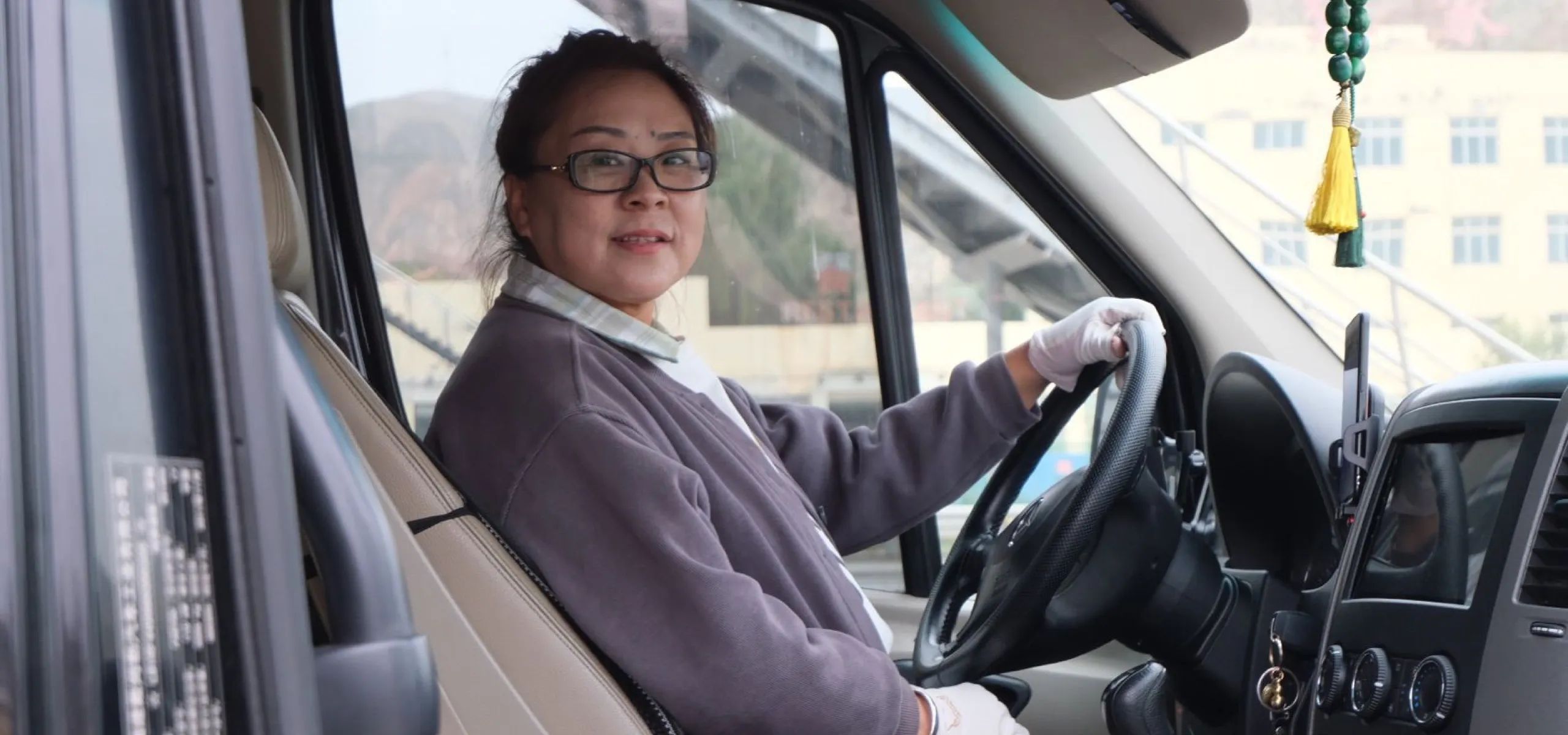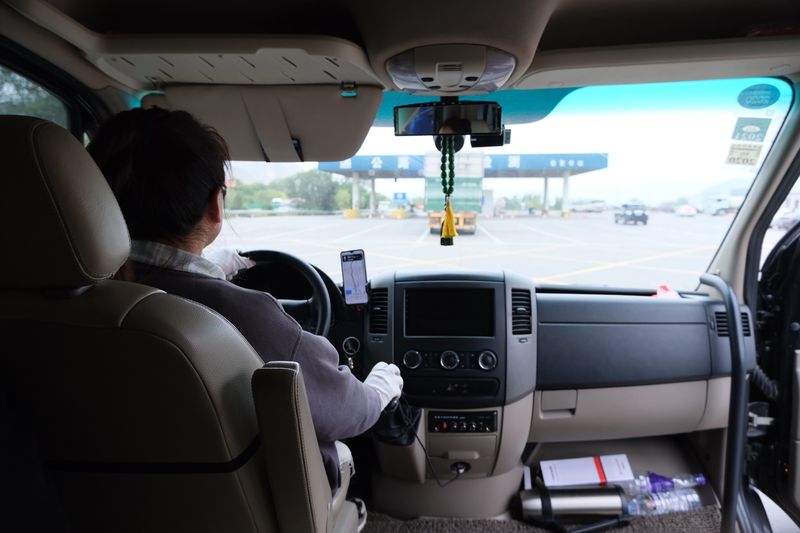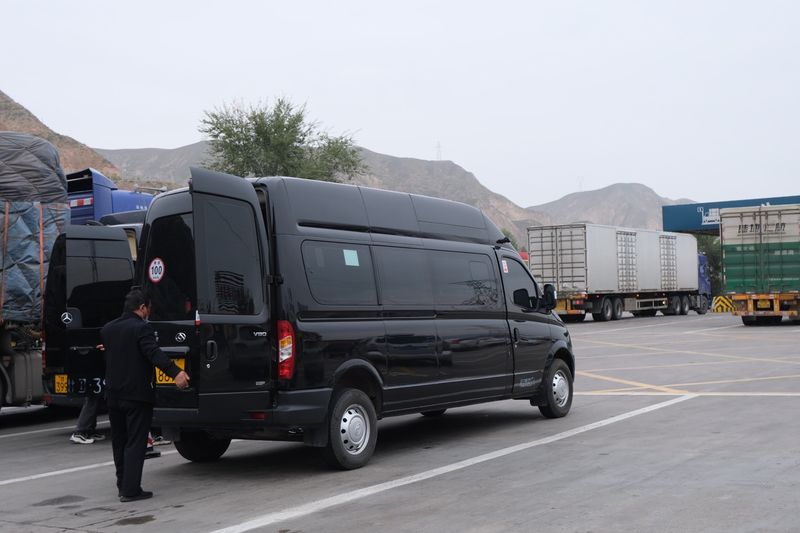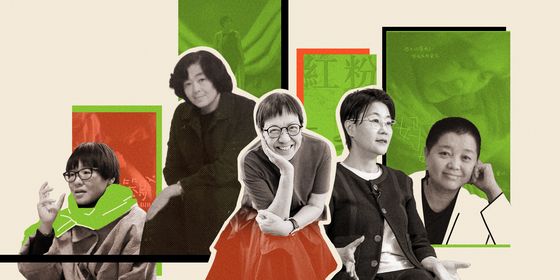“I’ve spent two-thirds of my life on the road”: A female tour bus driver speaks about working away from home and being a minority in a male-dominated field
My name is Xin Xiuhong. I am 49 years old, and I’ve spent about two-thirds of my life on the road.
After graduating from middle school, I started selling tickets for my father who was a long-distance bus driver in Gansu province. In 2001, at my father’s suggestion, I became a taxi driver in Baiyin, Gansu, for eight years. Twelve years ago, in 2009, I started driving this 17-seat tour bus on the Qinghai-Gansu loop line, a popular route that goes from Lanzhou in Gansu to Qinghai province and back. I had to obtain the A1 driving license to drive the tour bus, which was easy if you studied hard.
It feels good to drive tourists on the road, because I can enjoy the views. I drive seven or eight hours per day if our schedule is tight, and we only stop at the gas stations once or twice if the tourists or I need to use the restrooms or buy some snacks. This can be exhausting, but I’ve become used to it over the years. Life just passes by.
I divorced in 2012 and I have a 20-year-old son, who I barely spent time with when he was a child. My parents took care of him most of the time. Sometimes I feel regret for not being there to see him grow up, but I had no choice. My job took up all my time. Normally I would be on the road for eight days, rest for two or three days, and then get ready to drive again. My son is grown up now, and works away from home. Now I live with my 80-year-old father in Baiyin, and hired a nanny to take care of him when I’m on the road. Both my father and my son are very supportive of my job.
Although it’s very tiring to drive the tourists, I prefer driving the tour bus compared to the taxi. I like being on the road, especially since I can also visit the tour sites on the route. The view on the road soothes and cheers me up. When I drive the tourists to the tour sites and they get off the bus, I use that time to take a nap so that I have the energy to drive at night.
During the night driving, you must be particularly focused. You need to slow down and drive steadily while others are sleeping. Lots of accidents happen on the highway, but I’ve never been in any, nor was I ever scared by the news or the rumors I’ve heard. I think I’m an excellent driver, but I’ve been mistrusted by the tourists because of my gender. At the end of one trip, a male tourist told me he watched me the entire trip to see how I drive, and confessed that he didn’t believe I could handle such a long route in the beginning.
When people said such things to me, I wouldn’t say anything back. I just think it wouldn’t be a problem if you experienced my driving, and I prefer to prove my ability through actions. The male tourist complimented my driving skills at the end, said he thought I was great after his observations.
I bought my own bus on credit and paid it off month by month. I spent over 500,000 yuan to buy the bus and it took me four years to pay the money back. I cooperate with tourism companies who offer up gigs in WeChat groups. The drivers in the group decide if they want to accept the trip and the payment offered. Sometimes, they would specifically mention that they require male drivers. This doesn’t bother me. Some companies have had doubts about my abilities when they see that I am female, but I don’t think I’ve ever been rejected for a job just because of my gender.
Although driving experience is also taken into consideration, any company would prefer a male driver over a female one when hiring because men have more physical advantages. It’s my general impression of this industry. But I don’t think I’m worse than any male drivers. I think I am extraordinarily good at driving. Not even my period bothers me because I never suffered from pain, and I would normally stop at a gas station every three hours.
Over the past 12 years, I’ve seen three other women driving tourists on this route. The majority of buses, tour buses, and any vehicle on the highway are driven by men. My friends, especially female friends, have said they don’t feel that women could drive for such a long time. I agree with them sometimes, because the job is more demanding for women than men. Even a man might feel exhausted after driving 300 to 400 kilometers without rest, yet men have more physical and mental advantages compared to women.
There were several times that I felt so physically and mentally exhausted that I couldn’t stick to it. I wouldn’t let myself dwell on the idea, because I was driving, and I need to be responsible for my passengers’ safety. I would forcibly tell myself that I had to finish my job today, safe and sound.
I have thought about changing my job, because I am getting older and weaker one year after another. I think I will stay on the road for another two or three years, and then I might consider becoming a housekeeper. I wouldn’t recommend young women to do this job because it’s pretty exhausting. However, if you do enjoy being on the road and traveling, the job is suitable for you regardless of your gender. I enjoy being on the road, otherwise I wouldn’t have spent two thirds of my life on it.
Editor’s note: There are no statistics for the proportion of female drivers like Xin Xiuhong in the long-distance bus sector. However, the Social Science Academic Press published a report on truck drivers in 2020 stating that only 4.2 percent of truckers are female, and they generally face gender discrimination in the whole industry chain, from obtaining a driving license to getting equal pay with male drivers. Long-distance female drivers face physical challenges such as working while menstruating, pregnant, or nursing, as well as the even more difficult challenge of changing society’s biases toward their abilities.














